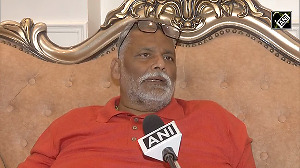Buoyed by the success of Chandrayaan-I, space scientists now plan to conquer new frontiers by sending a robot on moon in 2012 and a spacecraft to Mars the following year which will also see an Indian astronaut in space.
Indian Space Research Organisation has lined up a slew of missions which also include landing a spacecraft on an
asteroid and sending a probe to fly past a comet.
ISRO plans to send an Indian astronaut in space onboard a Russian mission in 2013 and follow it up with two Indian
astronauts on a seven-day mission on an indigenously developed rocket in 2015.
India's mission to Mars is at a conceptual stage right now, ISRO Chairman G Madhavan Nair told PTI on the sidelines of a felicitation of the Chandrayaan-I team by CII. "Next year we will be able to finalise and by 2013 it can take off," he said.
Nair said the current Geosynchronous Satellite Launch Vehicle, used to put communications satellites in orbit, will be used to launch the probe to Mars.
ISRO also plan to launch a sequel to Chandrayaan-I, which will entail landing a rover robot on moon by 2012. The lunar rover will be built in collaboration with Russia. "The design for Chandrayaan-II is ready," Nair said.
Last year, ISRO had sent to space a capsule which was recovered after keeping in orbit for 22 days. The Space
Recovery Experiment was seen as a technology demonstrator for future manned missions.
The launch of the Mars mission would be similar to that of Chandrayaan-I, Nair said, adding that the spacecraft will
first be launched in the earth orbit from where it would be raised to the Martian orbit.
India and Russia had also signed a Memorandum of Understanding on Joint Activities in the Field of Human Spaceflight Programme during the visit of Russian President Dmitry Medvedev on December five.
Under the MoU signed by Nair and his Russian counterpart Anatoly Perminov, ISRO and Russian space agency Roskosmos will jointly build the spacecraft for the Indian manned mission.
Indian space scientists will be redesigning the Soyuz space capsule of the Russian agency for the ISRO mission.
The government has already sanctioned Rs 95 crore to study all aspects of the manned space mission under which ISRO plans to send a two-member crew on a week-long sojourn in space.
The spacecraft, to be placed in a low earth orbit, will splash in the Indian ocean after completion of the mission.
ISRO is setting up an astronaut training centre in Bangalore. For the two-member mission, a batch of 200 would be
initially selected and trained before opting for four persons out of which two would go on the mission.





